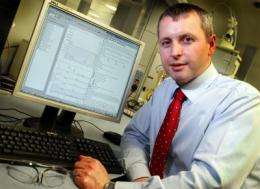Almac devises test to detect likelihood of colon cancer recurring

The findings of Almac scientists' research have been published in the online version of the Journal of Clinical Oncology (JCO) ahead of the print edition of the journal. The JCO is the peer-reviewed publication of the American Society of Clinical Oncology (ASCO), the world's leading professional society representing physicians who treat people with cancer.
Colon cancer is the third most common cancer in the US. Over 100,000 patients are diagnosed each year and around one quarter of these patients are diagnosed with stage 2 of the disease.
Stage 2 colon cancer has a relatively good prognosis with around 80% of patients cured by surgery but the disease will recur in the remaining 20% within five years.
Although the 20% of patients in which the cancer recurs may benefit from chemotherapy there is currently no test which doctors can use to help identify them.
The JCO report gives detail on the development and validation of a prognostic test designed by Almac, ColDX, specifically developed to identify high risk patients who may benefit from additional therapy.
Professor Paul Harkin, President and Managing Director of Almac's Diagnostic business and Professor of Molecular Oncology at Queen's University Belfast said:
"We have used complex technologies designed in Craigavon, Northern Ireland, to examine tumour samples from around the world to identify a genetic signature which tell us the likelihood of stage 2 colon cancer recurring. This technology will make it much more straightforward for doctors to identify high risk patients who may benefit from chemotherapy.
"Our highly novel test represents a significant breakthrough in how colon cancer can be managed. We believe it has the potential to change clinical practice and save the lives of some cancer patients. "Almac is committed to research which improves the health of people around the world and this is just one example of how we are working to achieve that."
Almac scientists including, Professor Richard Kennedy, Dr Max Bylesjo, Dr Peter Kerr, Dr Timothy Davison and Dr Vitali Proutski were involved in the research.
The test was developed using Almac's proprietary discovery technology and using clinical patient samples from around 14 clinical sites across the world including Queen's University Belfast.
Professor Patrick Johnston, Dean, School of Medicine, Dentistry and Biomedical Sciences at Queen's, said:
"We are pleased to have been able to play a role in helping Almac to develop this groundbreaking technology which we hope could save many lives in the future. Both Queen's and Almac are working tirelessly in advancing cancer research and treatments."
Following further external validation and commercialisation the test could be available to UK patients within a couple of years and potentially even sooner in the US.
More information: The full title of the article published in the Journal of Clinical Oncology is entitled: "Development and Independent Validation of a Prognostic Assay for Stage II Colon Cancer Using Formalin-Fixed Paraffin-Embedded Tissue". jco.ascopubs.org/content/early … 011.35.4498.full.pdf














